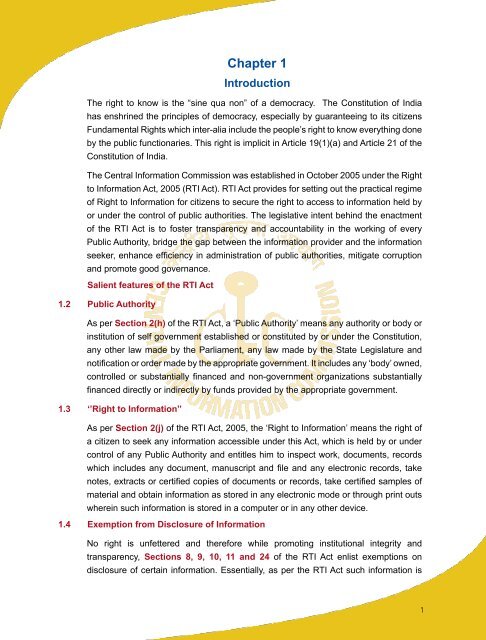Annual Report 2015-16
CIC%20Annual%20Report%20English-2015-16
CIC%20Annual%20Report%20English-2015-16
Create successful ePaper yourself
Turn your PDF publications into a flip-book with our unique Google optimized e-Paper software.
Chapter 1<br />
Introduction<br />
The right to know is the “sine qua non” of a democracy. The Constitution of India<br />
has enshrined the principles of democracy, especially by guaranteeing to its citizens<br />
Fundamental Rights which inter-alia include the people’s right to know everything done<br />
by the public functionaries. This right is implicit in Article 19(1)(a) and Article 21 of the<br />
Constitution of India.<br />
The Central Information Commission was established in October 2005 under the Right<br />
to Information Act, 2005 (RTI Act). RTI Act provides for setting out the practical regime<br />
of Right to Information for citizens to secure the right to access to information held by<br />
or under the control of public authorities. The legislative intent behind the enactment<br />
of the RTI Act is to foster transparency and accountability in the working of every<br />
Public Authority, bridge the gap between the information provider and the information<br />
seeker, enhance efficiency in administration of public authorities, mitigate corruption<br />
and promote good governance.<br />
Salient features of the RTI Act<br />
1.2 Public Authority<br />
As per Section 2(h) of the RTI Act, a ‘Public Authority’ means any authority or body or<br />
institution of self government established or constituted by or under the Constitution,<br />
any other law made by the Parliament, any law made by the State Legislature and<br />
notification or order made by the appropriate government. It includes any ‘body’ owned,<br />
controlled or substantially financed and non-government organizations substantially<br />
financed directly or indirectly by funds provided by the appropriate government.<br />
1.3 ‘’Right to Information’’<br />
As per Section 2(j) of the RTI Act, 2005, the ‘Right to Information’ means the right of<br />
a citizen to seek any information accessible under this Act, which is held by or under<br />
control of any Public Authority and entitles him to inspect work, documents, records<br />
which includes any document, manuscript and file and any electronic records, take<br />
notes, extracts or certified copies of documents or records, take certified samples of<br />
material and obtain information as stored in any electronic mode or through print outs<br />
wherein such information is stored in a computer or in any other device.<br />
1.4 Exemption from Disclosure of Information<br />
No right is unfettered and therefore while promoting institutional integrity and<br />
transparency, Sections 8, 9, 10, 11 and 24 of the RTI Act enlist exemptions on<br />
disclosure of certain information. Essentially, as per the RTI Act such information is<br />
1


